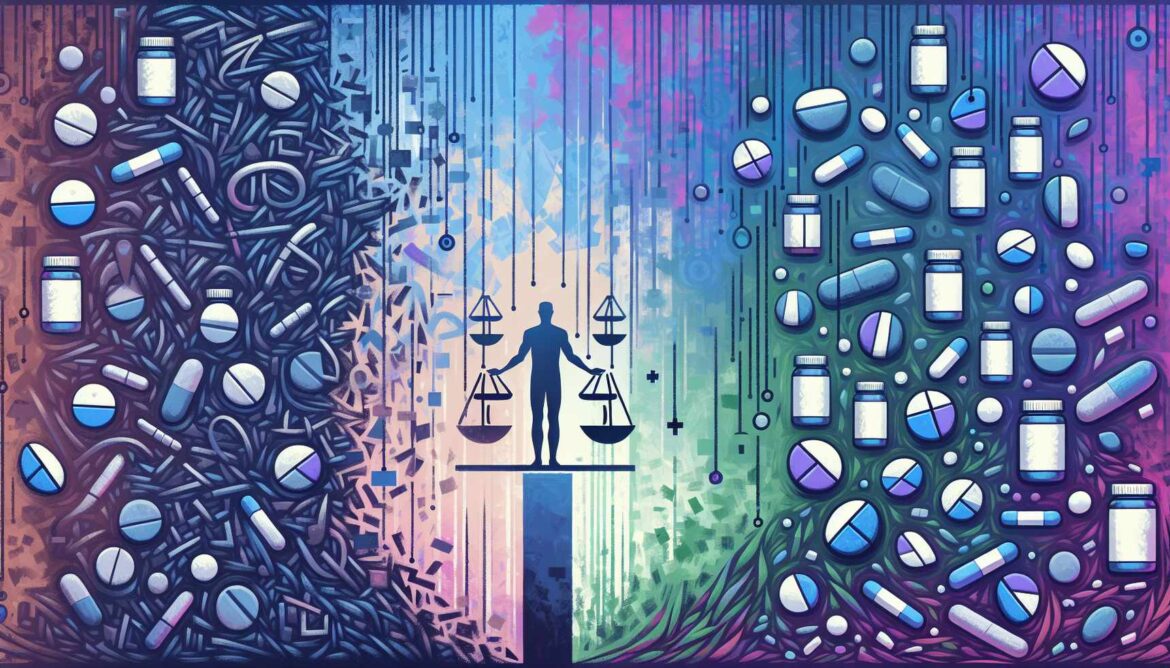Let’s talk about the thing nobody wants to admit: a lot of developers take medication for mental health. ADHD meds, antidepressants, anti-anxiety medications. And we’re terrified to talk about it.
Why? Because there’s this fear. This nagging worry that medication will make us worse at our jobs. That it will dull our edge. Slow our thinking. Turn us into zombies who can’t solve complex problems anymore.
We’ve bought into the myth that mental health medication is incompatible with peak cognitive performance. That you have to choose: be brilliant and suffer, or be medicated and mediocre.
It’s complete nonsense. But the stigma is real, and it keeps people suffering when they could get help.
So let’s have the honest conversation about psychiatric medication and coding. The one that actually acknowledges both the benefits and the challenges.
The stigma around medication in tech
Tech culture worships the mind. Intelligence is our currency. Performance is how we’re valued. So anything that might affect cognitive function feels threatening to our identity and our livelihood.
There’s also this romanticization of mental struggle. The tortured genius. The developer who codes through depression. The entrepreneur who builds companies while manic. We celebrate these stories while ignoring the human cost.
The truth? Untreated mental health conditions are far more likely to destroy your career than medication ever will. Depression makes you unable to concentrate. Untreated ADHD leads to missed deadlines and incomplete projects. Crippling anxiety prevents you from taking on challenges.
Medication doesn’t make you less of a developer. Sometimes, it makes you more of one.
Common medications and what they actually do
Let’s break down the most common types of psychiatric medications developers might encounter.
ADHD medications
ADHD is incredibly common in tech. Some estimates suggest up to 50% of people with ADHD also experience anxiety disorders. The relationship between ADHD and coding is complicated, hyperfocus can be a superpower, but executive dysfunction destroys productivity.
ADHD medications fall into two categories: stimulants like Adderall, Vyvanse, Ritalin, Concerta and non-stimulants like Strattera, Guanfacine, Intuniv.
Stimulants increase dopamine and norepinephrine in the brain, improving focus and reducing impulsivity. For many developers with ADHD, stimulants are life-changing. Tasks that felt impossible become manageable. Context switching becomes less jarring. Time management improves.
But they’re not perfect. Side effects can include appetite suppression, sleep disturbances, increased anxiety in some people, and potential for dependency if misused. Finding the right medication and dose often takes trial and error.
Antidepressants
SSRIs like Prozac, Zoloft, Lexapro, Celexa and SNRIs like Effexor, Cymbalta are the most commonly prescribed antidepressants. They work by increasing serotonin and sometimes norepinephrine in the brain.
For developers dealing with depression or anxiety, antidepressants can be transformative. They don’t make you happy. They make you capable of feeling again. They lift the fog that makes even simple tasks feel overwhelming.
Common concerns include potential weight gain, sexual side effects, emotional blunting for some people, and withdrawal symptoms if stopped abruptly. But for many, the benefits far outweigh the side effects. The ability to function, to work, to engage with life, that’s worth dealing with some drowsiness or dry mouth.
Anti-anxiety medications
Benzodiazepines like Xanax, Ativan, Klonopin are fast-acting but have high dependency risk. They’re typically prescribed for short-term use or as-needed for panic attacks.
Buspirone and beta-blockers like Propranolol are non-addictive alternatives for managing anxiety, particularly performance anxiety or physical symptoms like rapid heartbeat.
Many developers find that SSRIs prescribed for anxiety are more sustainable long-term than benzodiazepines.
The real impact on coding performance
Here’s what actually happens when developers take psychiatric medication:
graph TD
A[Starting Medication] --> B{Adjustment Period}
B -->|Weeks 1-4| C[Potential Side Effects]
B -->|Weeks 4-8| D[Body Adjusts]
C --> E[Fatigue]
C --> F[Brain Fog]
C --> G[Mood Changes]
D --> H{Right Medication & Dose?}
H -->|No| I[Work with Doctor to Adjust]
I --> J[Try Different Med/Dose]
J --> B
H -->|Yes| K[Stabilization Phase]
K --> L[Improved Focus]
K --> M[Better Mood Stability]
K --> N[Reduced Anxiety/Depression]
L --> O[Enhanced Performance]
M --> O
N --> O
O --> P[Sustainable Productivity]
style A fill:#e1f5ff
style H fill:#fff4e1
style P fill:#e8f5e9
style I fill:#ffe1e1The adjustment period
Most psychiatric medications take time to work. SSRIs take 4-6 weeks to reach full effectiveness. ADHD stimulants work faster but finding the right dose takes time. During this adjustment period, you might experience side effects. Fatigue. Brain fog. Nausea. Mood swings.
This is temporary. Your body is adjusting. But it’s also why you should be strategic about when you start medication if possible. Maybe not right before a major launch or during crunch time.
When medication works
When you find the right medication at the right dose, the difference is profound. Developers with ADHD often report being able to focus for extended periods without constant distraction, completing tasks instead of starting 10 and finishing none, improved time management and meeting deadlines, and reduced anxiety around work performance.
Developers on antidepressants describe being able to think clearly instead of through a fog, having energy to work instead of forcing themselves through exhaustion, caring about quality instead of just surviving, and actually enjoying coding again.
This isn’t making you superhuman. It’s bringing you to baseline. It’s allowing you to function the way your brain would if it weren’t fighting a chemical imbalance.
Potential challenges
Medication isn’t magic. Some developers experience emotional blunting, a reduction in emotional range. Some find certain medications affect creativity, though this varies greatly by person and medication. Sleep disruption, particularly with stimulants, can be an ongoing issue. And there’s always the challenge of finding the right medication and dose, which can take months.
But here’s the thing: these challenges are usually solvable. Talk to your psychiatrist. Adjust doses. Try different medications. Most people find something that works.
Practical strategies for developers on medication
Timing matters
If you’re on stimulants, timing your dose strategically can help. Take it before your most cognitively demanding work. If sleep is an issue, avoid late afternoon doses. Some developers split their dose to maintain focus through the workday.
For SSRIs, many people find taking them at night reduces daytime drowsiness.
Track your performance
When you start a new medication, keep a simple log. How’s your focus? Energy levels? Mood? Code quality? This helps you and your doctor assess what’s working and what needs adjustment.
Don’t rely on subjective feelings alone. Sometimes we feel worse when we’re actually performing better, or vice versa.
Communicate with your doctor
Be honest about side effects and how medication affects your work. Your psychiatrist can’t help if they don’t know you’re struggling. And they need to understand that cognitive performance matters for your career.
Good psychiatrists will work with you to find medications that help without destroying your ability to do your job.
Don’t skip doses
Some developers try to skip medication on weekends or during vacation. For some medications this is fine. For others, especially SSRIs, it can cause withdrawal symptoms and mood instability.
Talk to your doctor before changing your dosing schedule.
The disclosure dilemma
Do you tell your employer you’re on psychiatric medication? There’s no universal answer. You’re not legally required to disclose medication use unless it affects your ability to perform essential job functions or if you’re requesting accommodations.
Some considerations: company culture around mental health, whether you need accommodations like flexible hours during adjustment periods, your relationship with your manager, and job security and performance track record.
If you do need to disclose, you can be vague. “I’m managing a medical condition” is sufficient. You don’t owe anyone details about your medication.
Medication isn’t the only answer
Psychiatric medication works best as part of a comprehensive approach. Combine it with therapy, particularly CBT or DBT, lifestyle changes like exercise, sleep hygiene, nutrition, stress management techniques, and building a support network.
Medication is a tool. A powerful tool, but still just one piece of managing your mental health.
When to seek medication
Consider talking to a psychiatrist if your symptoms significantly impair work performance, self-help strategies haven’t worked, symptoms persist for months despite therapy, or you’re having thoughts of self-harm.
You don’t have to be in crisis to get help. Medication is for prevention and quality of life, not just emergencies.
Breaking the stigma
The more we talk openly about medication, the less power the stigma has. You’re not weak for taking medication. You’re not broken. You’re addressing a health condition, the same as someone taking insulin for diabetes or medication for high blood pressure.
Your brain is an organ. Sometimes organs need medical intervention. That’s not a character flaw.
And here’s what nobody tells you: some of the most successful developers you know are on medication. They just don’t talk about it. But they’re out there, building amazing things, leading teams, solving complex problems, all while managing their mental health with medication.
You can too.
If you’re struggling with mental health and wondering whether medication might help, talk to a psychiatrist. Get an evaluation. Ask questions. You don’t have to commit to anything, you’re just exploring options.
And if you’re already on medication but feeling shame about it, let that go. You’re taking care of yourself. That’s not just okay, it’s smart. It’s brave. It’s what you need to do to be the best developer you can be.
Your mental health matters more than any code you’ll ever write. Take care of it.
References
- National Center for Biotechnology Information: “Overview of Psychiatric Medications in the Pipeline in Phase III Trials as of June 1, 2024” – https://pmc.ncbi.nlm.nih.gov/articles/PMC11424068/
- Psychiatry Advisor: “FDA Roundup: Psychiatry Drug Alerts” – https://www.psychiatryadvisor.com/features/psychiatry-fda-drug-alerts-2024/
- Spark Mental Health: “Upcoming ADHD Medications: What to Expect in 2025” – https://www.sparkmentalhealth.com/upcoming-adhd-medications-what-to-expect-in-2025/
- Atlanta Integrative Psychiatry: “ADHD Medications For Adults With Anxiety” – https://www.atlantaintegrativepsychiatry.com/blog/2024/03/13/adhd-medications-for-adults-with-anxiety/
- ADDitude Magazine: “Top 10 ADHD News & Research Headlines of 2024” – https://www.additudemag.com/adhd-research-news-stimulant-shortage-vyvanse-medication/







